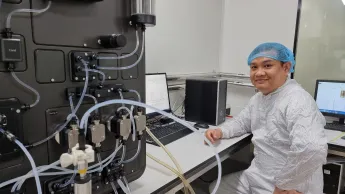Hope for Vietnam: an alumnus is developing a coronavirus vaccine
- 2021-04-19
- Sabine Buchwald
- Comment

During his time in Germany, Vietnamese researcher Dr Do Minh Si never dreamt that a few years later he would be conducting research into a lifesaving vaccine to combat the COVID-19 pandemic. ‘Now I can exploit all my knowledge and am benefiting from the German spirit,’ says the 41-year-old alumnus. Si helped to establish the pharmaceutical company Nanogen in Ho Chi Minh City in 2008, and is now its director responsible for research and development.
Si and his team have for some months been conducting research into the development of a new vaccine in Vietnam to combat the coronavirus. Their initial findings are promising. The biotechnologist hopes his company will be able to launch a vaccine called as early as autumn 2021. ‘We seem to be on track – we’re already in the second phase of testing the serum on healthy volunteers,’ says Do Minh Si.
The adverse effects of environmental chemicals
Do Minh Si was awarded his doctorate by the . He conducted biological research there from 2004 until 2007, more precisely in the Working Group for Animal Physiology and Biochemistry with Professor Jan-Peter Hildebrandt. ‘I really enjoyed my time in Greifswald,’ enthuses Do Minh Si. He was primarily looking into environmental chemicals and their adverse effects on humans and animals. The specialist subject of his doctoral thesis was molecular biology.
A cost-effective, global vaccine
Do Minh Si considers it important that this vaccine can in future be produced at a reasonable price and offered on a basis. His plan is for a single dose to cost no more than five US dollars. The optimum effect requires two vaccinations. Do Minh Si’s declared aim is also to produce large amounts of ‘Nanocovax’ in Vietnam. It would be the country’s first indigenous vaccine. The researcher is also negotiating with other Asian countries to establish production facilities there.
It’s important to him that his vaccine in particular benefits the population in less wealthy countries, such as in his home country, Bangladesh or Myanmar. The team around Do Minh Si is also conducting research into medications containing monoclonal antibodies that bring relief to patients infected with the coronavirus and prevent severe progression. Dr Si suggests that he is considering a spray which would be quick and simple to use.
Storage at fridge temperature
One positive aspect in favour of ‘Nanocovax’ is that the serum can be transported and stored at fridge temperature, i.e. at temperatures between two to eight degrees, explains Do Minh Si. It is a so-called protein vaccine that contains components of the SARS-CoV-2 coronavirus. This type of vaccine causes the immune system to react to the protein and retain this response. The body is then prepared for the next time it is confronted with the corresponding virus. Influenza vaccines also work based on this method. ‘We’ve enjoyed good experience with this over many years,’ says the Vietnamese researcher.
In the years prior to the pandemic, Do Minh Si conducted genomic research into active substances for hepatitis C infections and rheumatic diseases. The focus of his work is currently on the coronavirus vaccine, albeit Vietnam has so far experienced fewer infections than in other countries. Also very few people have died from COVID-19. At the start of the year, it was reported to be fewer than a hundred.
Do Minh Si still remains in close contact with his doctoral supervisor Jan-Peter Hildebrandt from the University of Greifswald. ‘Do Minh Si has a lot of really great ideas,’ says Hildebrandt. He is applying all his knowledge to achieve something for society. ‘His ingenuity and thirst for research mean he can be a force for good.’ The University of Greifswald has fostered close collaboration with partner higher education institutions in Vietnam since the end of the 1960s. Its exchange programmes are funded by scholarships provided by the German Academic Exchange Service (DAAD) and the Vietnamese state. Since 2002 it has maintained a regional office at the university in Hanoi – the Joint Education and Training Centre (JETC). Do Minh Si was one of the first students there before he travelled to Germany.
Now Do Minh Si is himself lecturing at the Vietnam National University in Ho Chi Minh City, where he once studied. He not only imparts the latest research findings from immunology and biotechnology to his students, they can also learn from him how to be curious and open to innovations.
Further information
- How vaccinations are helping in developing countries around the world
